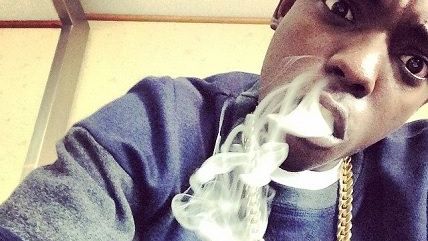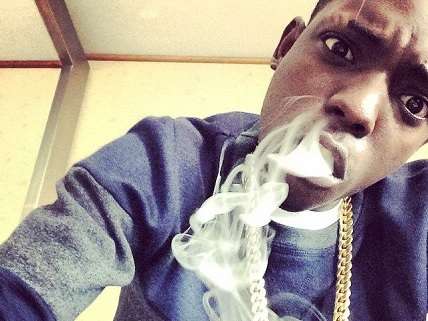Why Not Blame Gun and Drug Laws for Rapper Bobby Shmurda's Legal Troubles?
Because throwing shade at capitalism is easier.


Over at Complex, David Drake writes about the controversy surrounding rapper Bobby Shmurda. Shmurda was arrested by police in New York City last December on gun- and drug-related charges stemming from a two-year long investigation and is being held on $2 million bail. Epic Records signed Shmurda in July and released his single "Hot Nigga," which peaked at number six on Billboard's Hot 100 and had an associated dance that went viral.
After his arrest, some people on social media, as people on social media are wont to do, declared that paying Shmurda's bail is something his record label Ought To Do. Drake writes it off as "a bout of social media self-righteousness,"—but doesn't rule out the possibility it could pressure the label company to act—and also identifies Epic Records as a "scapegoat" for America's "collective guilt over the rapper's tragic situation—a situation that is replicated day-to-day across America, with or without hit records." Via Complex:
The "left" would argue that Shmurda was a product of circumstance, an innocent young man who is a victim of broader social ills—as if, if we solved the problems of poverty and racism, this lifestyle would have no pull. The "right" argues that the "left"'s reading denies Shmurda agency; that he made his choices, and now must pay the cost. If those choices happen to include gun crimes, he must be crazy, a monster—so much the better that he's locked up.
Both sides see Shmurda's behavior as pathological: the "left" as a result of circumstance, the "right" as a conscious decision. Either way, the end result is dehumanizing. Shmurda is not a victim of circumstance working in a broken system, nor is he crazy. Quite the opposite: Bobby Shmurda is a rational actor within a system working exactly as it's supposed to. Pathologizing Bobby Shmurda, as we pathologize everyone shoveled directly through the school-to-prison pipeline, is our own moral justification for imprisoning so many young people: a release valve, a logical shortcut to rationalize having denied him and so many others the same opportunities we've received.
From there it moves on to a vaguely anti-capitalist rant about poverty not being solvable "in the current system" (free markets, in fact, are the best antidote to poverty). What do you expect? It's a music magazine. But Drake did hit on an important point: Shmurda is indeed something of "a rational actor." And the "right" is right, he has made a "conscious decision." Drake identifies the charges against Shmurda only by quoting The New York Times: "gang conspiracy and gun charges." But the charges are crucial to the conversation.
What were they? Shmurda was charged with conspiracy (four counts), criminal possession of a weapon, criminally using drug paraphernalia, and reckless endangerment. With the exception of the last one, none of these charges have at their core any kind of violent or non-consensual behavior*. The conspiracy charges related to the sale of drugs—providing a product people want at a price they're willing to pay, and arranging for security in the absence of legal protections—while in New York City the "reckless endangerment" could just mean carrying an illegal gun on your person. Possession of a firearm, technically, is a constitutionally protected right. But not in New York City. And that's thanks not to the capitalist "system" but the democratic one—New York City's elected leaders made the conscious decision to criminalize possession of an inanimate object, just as elected leaders at all levels of government help keep drugs illegal.
As more and more jurisdictions relax the prohibition on marijuana, it's important to keep in mind not just that other drugs remain illegal but that elected leaders around the country still tend to have the urge to demand the criminalization of more inherently non-violent behavior, from gun ownership to sex work. The problem of politicians attempting to exert control over our behavior by threatening our freedoms is a much easier problem to "fix" than poverty, in pretty much any system.
*Correction: Two of the counts accused Shmurda, and 11 others, of conspiring to commit murder and assault, although Shmurda was not among those charged with attempted murder or assault.


Show Comments (35)